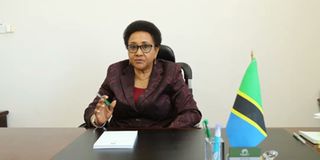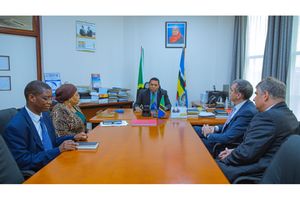Prime
Why Tanzanian troops will remain in Mozambique's Cabo Delgado

Defence minister Stergomena Tax. PHOTO | FILE
What you need to know:
- Defence minister Stergomena Tax confirmed the reports, saying the arrangement will be covered by a bilateral agreement between Tanzania and Mozambique
Dar es Salaam. The Tanzania People’s Defence Force (TPDF) is set to remain longer in Mozambique after the SADC mission expires on July 15, 2024, The Citizen has learnt.
Defence minister Stergomena Tax confirmed the reports, saying the arrangement will be covered by a bilateral agreement between Tanzania and Mozambique
“Yes, our soldiers will continue their stay in Mozambique beyond July 15. It is not a unique thing, there are several such bilateral arrangements in Mozambique with other countries,” Dr Tax told The Citizen.
She, however, did not say how long the troops were likely to stay or how many soldiers Tanzania was going to commit to the mission.
Sources in Mozambique have intimated that the TPDF could be forced to step up its numbers to fill the void that is set to be left by the departing troops from the other SADC countries in resisting attacks by the jihadists of ASWJ (Ansar al-Sunna Wa Jamma), also known as ISIS-Mozambique.
On Thursday, Mozambican President Filipe Nyusi announced that Tanzanian troops would remain in the northern province of Cabo Delgado, to support the Mozambican defence and security forces in the fight against terrorist groups.
The Tanzanians forces, according to President Nyusi will no longer be part of the SADC Military Mission in Mozambique (SAMIM).
Speaking in Maputo at the opening of the 10th edition of the Mining and Energy Conference of Mozambique, President Nyusi said, “It is true that our brothers from the Southern African Development Community who are supporting us are leaving, after having achieved a crucial stage of stabilisation.
The Lesotho contingent has already left, and Botswana and South Africa are leaving. But the force from Tanzania is remaining, and is cooperating with us under a bilateral arrangement.”
Rwandan troops will also remain in Cabo Delgado with the Rwandan authorities confirming that they could increase the number of troops, to fill any gaps left by the ending of the SAMIM mission.
South African President Cyril Ramaphosa informed the South African parliament in late April that a South African contingent will remain in Mozambique until the end of 2024.
However, the Mozambican authorities say they have received no official information from their South African counterparts regarding the latest development.
The first SAMIM contingent to withdraw was Botswana, followed by South Africa. The remaining six contingents from Angola, Democratic Republic of Congo, Lesotho, Malawi, Tanzania and Zambia are set to end their mission in Mozambique by July.
President Nyusi said his government is continuing its work to stabilise Cabo Delgado, and the departure of SAMIM should be interpreted as a shift from one stage to another in the long path of struggle against terrorism.
President Nyusi also expressed his optimism that the US oil and gas giant ExxonMobil remains committed to liquefied natural gas (LNG) projects in Cabo Delgado.
He cited ExxonMobil officials as saying “We are here to stay”. After his visit to the United States in April, President Nyusi said he had received guarantees from ExxonMobil that its proposed investment in Mozambique’s natural gas is on track for a Final Investment Decision in 2025.
In another development, the Mozambican Attorney-General’s Office has designated two Tanzanians as terrorists in a list published in the Mozambican official gazette, the “Boletim da Republica”.
Ally Yussuf Liwangwa, aka “Big Ally, a trader and traditional healer from Dar es Salaam who reportedly recruited 50 youths into the terrorist group, faces charges of membership of a terrorist organisation, instigating terrorism and financing terrorism.
On the other hand, Safina Maulana, 36, a native of Mtwara allegedly worked with the jihadists in Palma, faces charges of aggravated theft and membership of a terrorist organisation.




